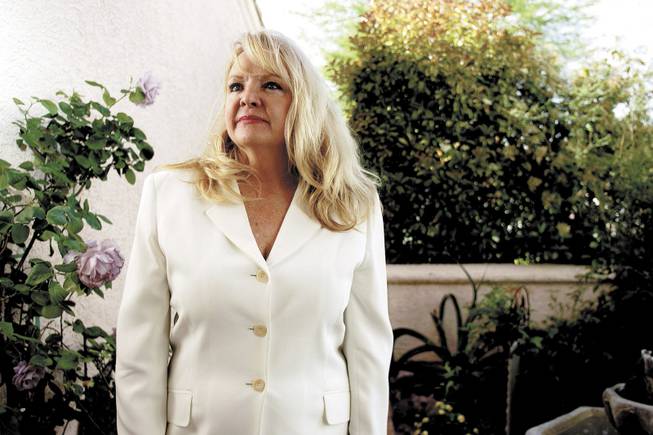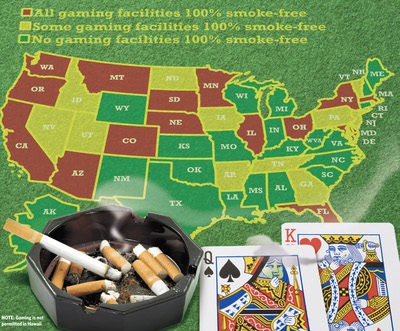
Terrie Price, outside her home in Las Vegas in April, dealt cards for 26 years at Caesars Palace, whose management, she says, “didn’t care” about dealers’ health. “We’ve been waiting a long time for this” study, says Price, who vigorously supports an industry-wide smoking ban.
Thursday, May 7, 2009 | 2 a.m.
Sun Archives
- Closer look at smoking ban (5-1-2009)
- Casino restaurant patrons can't elude secondhand smoke (1-16-2009)
- Study finds high pollution levels in casino restaurants (1-15-2009)
- Smoking ban not doing all the banning sponsors hoped (7-21-2009)
Las Vegas casino dealers are exposed to a host of harmful chemicals through secondhand smoke while on the job, according to a new National Institute for Occupational Safety and Health study.
The study, the first to examine the effects of secondhand smoke in Las Vegas casinos, reported that the dealers had traces of a tobacco-specific carcinogen in their urine.
The results were drawn from 124 casino dealers at Bally’s, Caesars Palace and Paris Las Vegas who wore portable pumps that measured the level of tobacco smoke in the air during their shifts. In addition, 114 dealers submitted urine samples to the agency before and after their shifts.
The institute conducted research and interviewed workers during three on-site visits from July 2005 through January 2006.
Anti-smoking advocates hailed the results of the long-awaited study, which mirror previous government and privately funded research on secondhand smoke and are expected to provide ammunition to those pressuring the gaming industry to implement smoking bans.
“Casino workers deserve the same rights as other workers, including the right to a healthy and safe workplace, free from toxic secondhand smoke,” said Cynthia Hallett, executive director of Americans For Nonsmokers’ Rights. “After the release of this report, we hope to see casino workers protected by strong smoke-free workplace laws throughout the country.”
But insiders said that won’t be easy, even if many casino executives privately support the idea. The industry has long fought smoking bans, fearing they would cut into profits as smokers go elsewhere to light up or interrupt their games to smoke outdoors.
With the recession pushing some casino companies to the verge of bankruptcy, some insiders say the industry would put up an even bigger fight during such a critical time.
“If we (ban smoking) and competitors don’t follow suit, what then?” said one executive, who asked not to be named.
The institute’s report found that a majority of the 147 dealers who completed a separate health survey reported symptoms such as red or irritated eyes, a cough, stuffy nose, runny nose and headache. In total, 11 percent of the dealers studied, who did not work in poker rooms at the time, had been diagnosed with asthma, while 35 percent had symptoms suggestive of work-related asthma. Many poker rooms have voluntarily banned smoking.
“That strikes me as enormous,” considering that only about 7 percent of the national population suffers from asthmatic symptoms, said James Repace, a biophysicist and former EPA scientist who has testified in smoking lawsuits against businesses, including casinos. “This is an important result that broadens the information we have on secondhand smoke.”
While the sample size was relatively small, it’s significant for a study of this kind, said Repace, who has conducted similar studies that have been published in academic journals.
The study adds a significant chapter to a small body of research on secondhand smoke in casinos.
Although some scientists and other researchers who support smoking bans have conducted such research, the institute — which conducts research and offers recommendations, but doesn’t enforce workplace safety — has completed a handful of studies on secondhand smoke, but only one other casino study, of Bally’s workers in Atlantic City, focusing on secondhand smoke.
Institute officials said the study’s results were in line with previous research conducted by various groups on secondhand smoke. Officials blamed the more than three-year lag time in completing the study on staffing, turnover and a backlog of other research reports.
“This took longer than we would have liked,” said Christine West, a nurse epidemiologist for the institute and study co-author, adding that casino management fully cooperated with researchers during the information-gathering process.
Few government studies exist in part because institute evaluations are driven by employee complaints and workers fear they will be fired for requesting a study of their workplaces, said Stephanie Steinberg, chairwoman of Smoke-Free Gaming, a Colorado-based group that lobbies for smoking bans in several states, including Nevada.
“This rigorous evaluation shows this isn’t just the perception of the employee. It’s a reality that they were exposed to carcinogens at work,” she said.
Terrie Price, who dealt cards at Caesars Palace for 25 years, requested the agency study the air at Caesars and the other casinos, where colleagues worked. She called the study a vindication of two decades’ worth of complaints.
“We’ve been waiting a long time for this,” she said.
A spokesman for Harrah’s Entertainment, which owns the casinos at issue in the study, declined to comment on specific findings, saying the company is still reviewing the report.
In response to the smoking ban recommendation, spokesman Gary Thompson said the company would consider a nationwide smoking ban provided that it includes all gambling venues, such as racetracks and tribal casinos.
The study comes as many properties, including those owned by Harrah’s, have voluntarily banned smoking in poker rooms as well as at certain slot machines and tables. A few years ago, Harrah’s began offering smoking cessation courses for employees and financial incentives for workers who quit smoking.
And yet, while most states have smoke-free workplace laws, most states that allow gambling also have built-in exemptions for gambling venues such as casinos or racetracks.
Nevada’s Clean Indoor Air Act, approved by a majority of voters in 2006, includes an exemption for the gambling floors of casinos and bars that don’t serve food. Las Vegas video poker bars are pushing legislation that would partially roll back the initiative by allowing smoking in bars that prevent access to minors.
Although the casino industry has publicly opposed smoking bans, many decision-makers, at least privately, appear to be split on the issue.
Some casino executives, who declined to be named, say some companies are vehemently opposed to the idea of smoking bans, even ones that could be universally applied. Others are leaning toward nonsmoking environments.
With the rapid spread of smoking bans in recent years, the American Gaming Association, which lobbies on federal issues, in 2007 dropped efforts to fight smoking bans to avoid taking sides among competing members at the local and state levels.
“Indoor air quality is an issue that will be addressed on a company-by-company, jurisdiction-by-jurisdiction basis,” American Gaming Association Executive Director Judy Patterson said Wednesday.
While national advocates turn up the heat on casino companies, local agencies are taking a wait-and-see approach to casino smoking bans.
Maria Azzarelli, a tobacco control coordinator with the Southern Nevada Health District, said the agency doesn’t intend to use the report to press for a smoking ban. The Health District focuses on education and prevention rather than lobbying, which is the realm of advocacy groups, she said.
The report should be no surprise to anyone on either side of the smoking debate, she added.
“The gaming industry is aware of all this, as many gaming establishments have voluntarily limited smoking because their patrons are asking for it. It’s a good business decision for these entities.”
This story as been corrected. An earlier version had the wrong number of years Terrie Price had been dealing cards.


Join the Discussion:
Check this out for a full explanation of our conversion to the LiveFyre commenting system and instructions on how to sign up for an account.
Full comments policy